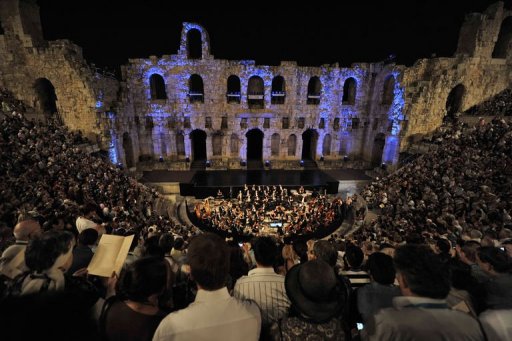Aristotle, Plato and Socrates have resurfaced in Athens in the midst of Greece’s harrowing economic crisis, brought to life by a global philosophy congress in the very locations they once frequented.
Organised by the International Federation of Philosophical Societies (FISP) every five years in a different city — and in Athens for the first time — the congress was a welcome boost to the country’s struggling economy, and the Greek capital which has been hit hard by anti-austerity protests.
Most lectures took place at the Athens University’s philosophy department on the city’s leafy outskirts, but choice events were held in locations considered as hallowed philosophy ground by scholars worldwide.
These included the Lyceum of Aristotle, Plato’s Academy and the Pnyx, a hill near the Acropolis that hosted citizen assemblies in classical antiquity.
And for crisis-hit Greeks, “it’s moral support” to be reminded of their country’s special history, she said.
Event topics ranged from philosophy of politics, language, science and religion to ethics, cosmology and contemporary interpretations of the writings of Aristotle, Descartes, Heidegger, Kant, Nietzsche, Plato, Rousseau, Socrates and Spinoza.
Rediscovered in 1996, the Lyceum of Aristotle was one of three gymnasia where the city’s youth received physical and mental training, learning how to become future Athenian citizens some 2,500 years ago.
It was abandoned in the fourth century AD and was unearthed in central Athens during excavation work on a modern art museum.
Archaeologists are still researching the 1.1-hectare (2.7-acre) site, which includes the remains of the Lyceum and the Palaistra — or wrestling school — and is still not open to the general public.
A bit further afield, some two kilometres (1.2 miles) from the city centre lies Plato’s Academy, arguably the world’s first university, founded in the fourth century BCE, and later shut down by the Byzantine emperor Justinian.
On Tuesday, it saw Enrico Berti of Italy analyse the contemporary relevance of Aristotle’s philosophy as Japan’s Noburu Notomi dissected Platonic influences in East Asia.
And at the Pnyx on Thursday, Chinese professor Chen Lai expounded on the practical wisdom in Confucian philosophy while Alexander Nehamas of Princeton University asked: “Is living an art that can be taught?”.
Lectures were also given on the banks of the ancient river Ilissos — which was mostly covered up in the early 20th century — where Socrates famously “taught that eros is love of knowledge, truth and beauty,” the organisers said.
For participants, Greek as well as foreign, it was an opportunity to transcend daily troubles.
Boni admitted that philosophy may not hold answers to the crisis.

COMMENTS
Please let us know if you're having issues with commenting.